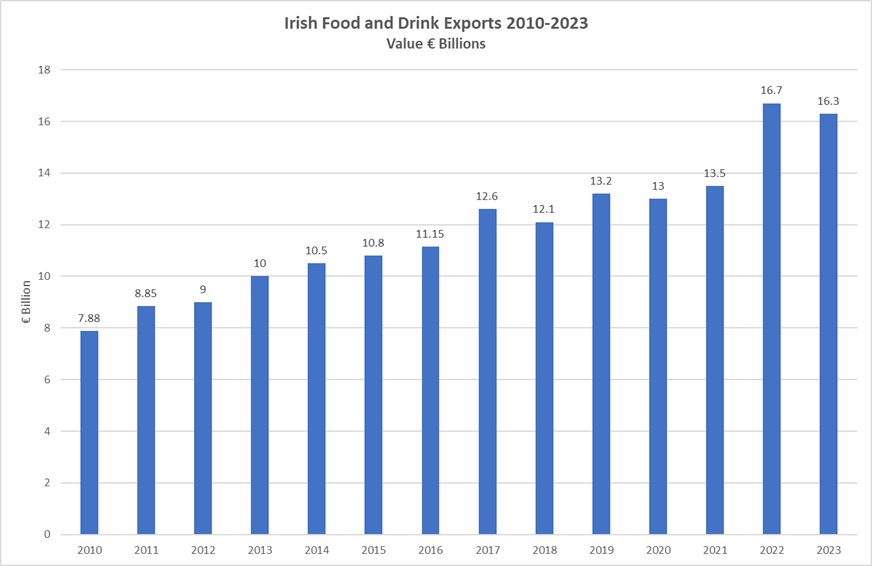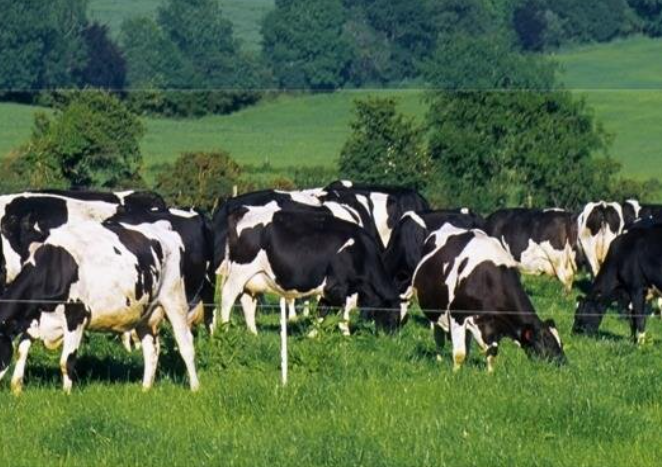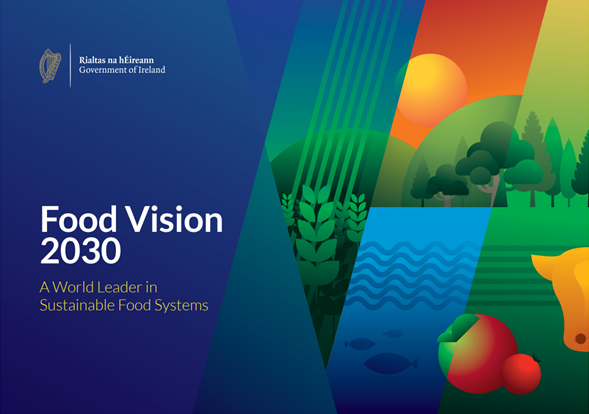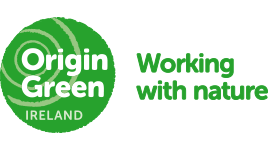

Irish agriculture is dominated by family-owned farms. There are almost 135,037 farms, with an average land holding of 33.4 hectares. Pasture-based farm enterprises dominate, thanks to Ireland’s rich green grass growth for 9 to 10 months a year. As a result, Irish output is dominated by dairy and livestock, especially beef. Dairy and beef account for two-thirds of gross agricultural output and similar proportions of agri-food exports. With the lifting of EU milk production quotas in 2015 Ireland’s milk production increased from 5.6 billion litres in 2014 to 8.8 billion litres in 2022 representing an increase of over 36%.
In 2023:-
- Ireland exported €16.3 billion in food, drink and horticulture exports
- Slight decrease of 4% on 2022 when exports grew a record 22%
- Export value still 24% higher than 2019.
- Irish agri-food exported to over 175 countries
- Dairy sector accounts for 40% (€6.3bn) of overall food and drink exports
- Beef exports 489,000 tonnes, down 3%
- However, Ireland continues to be the largest net exporter of Beef in the Northern Hemisphere
- Prepared Consumer Foods exports increased 7% to €3.1 billion
- Butter exports €1.3 billion
- Cheese exports €1.3 Billion
- Beverages exports €1.8 billion
- Irish Whiskey accounted for 49% of beverages exports
- Irish agri-food sector employed over 164,900 people, 6.4% of the total working population

The strategic vision for the agriculture and food sector is set out in a series of 10 year plans, published every five years. In 2021, Food Vision 2030 was published, succeeding 2015’s Food Wise 2025. These plans emerge from a consensus-based process which includes stakeholders – farmers, food processors, representative bodies, researchers, government agencies, consumer representatives, retailers and environmental protection authorities. The planning process identifies and agrees growth targets that the industry believes it can achieve, together with plans to address the key obstacles and limiting factors. Critically, the plans establish a shared vision for the sector among all stakeholders.
The planning process creates cohesive, action-based roadmaps, with specific development measures and targets. The actions are owned by the participants, who report on implementation on an ongoing basis over the lifetime of the plan. Implementation is also supported by activation measures, run by sub-groups of the parent implementation committee.
In 2021, the latest of these strategies, Food Vision 2030, was published in support of Ireland’s aim of becoming a world leader in Sustainable Food Systems (SFS). The strategy is implemented across four missions which are underpinned by the three pillars of sustainability – Economic, Environmental, and Social.
The policy recommendations in Food Vision 2030 reflect the holistic nature of a Food Systems approach required to achieve the objectives identified in the document.
Objectives include:
- achieving a carbon-neutral food system by 2050, with verifiable progress by 2030, encompassing emissions, water quality and biodiversity;
- increased carbon sequestration; and a scale-up of on-farm renewable energy sources.
- developing a more diversified and resilient agri-food sector, based on circular economy principles, including targets for reducing food waste.
- Promoting an upward trend in Family Farm Income towards 2030, with an increased share of viable and sustainable farms and an upward trend in primary output value with increased diversification across sectors
- Maintaining grass-based livestock production at the core of Ireland’s agri-food output
Furthermore, the Strategy contributes to a roadmap of recovery and enhanced resilience for the Irish agri-food sector in light of the COVID-19 pandemic by promoting policies that support social sustainability and greater regional and rural development through investment in community-based developments.
In adopting a food systems approach for its national agri-food strategy, Ireland is demonstrating its commitment to sustainability. This will ensure it continues to produce safe, nutritious, and high-value food for generations to come. To this end, we encourage and support investment in innovation across the agri-food sector and establish ourselves as leaders in Sustainable Food Systems on the global stage.

Other key aspects of Ireland’s agri-food profile:
- Ireland is the world’s first country to implement a national sustainability programme for agriculture and food – Origin Green – which unites government, producers and the private sector on a journey to make Ireland’s food and drink sector the most sustainable in the world.
- As an exporting nation, Ireland’s agri-food sector is export-led and driven by in-depth consumer demand insights from our key export markets.
- The use of technology and innovation is fostered to add value, build competitiveness and to address key challenges of the sector, such as environmental sustainability. For example, Ireland’s national beef genomics programme aims to lower the intensity of GHG emissions by improving the genetic merit of the national beef herd.
- Ireland has been ranked first or second on the Global Food Security Index (GFSI) from 2016 to 2022, the latest available ranking. The GFSI ranks countries based on three and more recently four sub-indices of Food Availability, Food Affordability, Food Quality & Safety and Sustainability & Adaptability. Some of the factors highlighted by the GFSI for Ireland's continued high ranking include high levels of Food Safety and high expenditure on Agricultural Research & Development.

-2000x400.jpg)